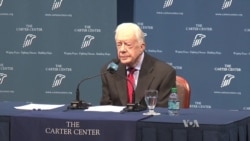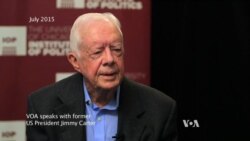Former U.S. president Jimmy Carter says tests on a mass removed from his liver reveal he has melanoma, usually a type of skin cancer, that has spread from his liver to his brain.
"At first, I thought it was confined to my liver and that the operation had completely removed it, so I was quite relieved," Carter told reporters in Atlanta Thursday.
But the former president says his positive outlook changed later that same day when a further test revealed tumors in his brain.
"I just thought I had a few weeks left, but I was surprisingly at ease," Carter admitted. " I've had a full life, I have thousands of friends.... So I was surprisingly at ease, much more so than my wife was.”
Worldwide speculation
There has been much speculation in the worldwide press about Carter's health since the initial August 12 announcement he was battling cancer.
His wife of 69 years, former first lady Rosalynn Carter, sat in the first row of seats Thursday at the Carter Center auditorium, as the 39th U.S. president answered extensive questions about his well being and his outlook as he begins a regimen of radiation treatment and drugs to combat the cancer.
“I can’t really anticipate how I’ll be feeling, obviously," Carter said, "but I’ll have to defer quite substantially to my doctors regarding the treatment.”
Historians say Carter’s move to publicly discuss his health issues is rare among former presidents. But cancer has been a foreboding diagnosis for other members of his immediate family.
Family history
His father, his brother, and his two sisters died from the disease, which his mother also developed later in her life. Carter wrote about his family’s battles with cancer in his latest book “A Full Life.” He had just completed a tour to promote the book the week before doctor’s removed a mass from his liver.
Carter says he knew about the mass soon after he had to cut short his participation in a Carter Center election-monitoring trip to Guyana in May because of a cold. He delayed surgery on his liver until after the book tour.
In an exclusive interview with Voice of America during that book tour, Carter reflected on his long life, and why he wrote the book.
"What I've tried to do in the book is tell things that I've never told before,” he told VOA. “Like my almost getting killed on a submarine, and also the lessons that I've learned, some of which were very negative at the time, some of which were positive."
WATCH: Carter tells VOA about his book, efforts to fight guinea worm
Carter says one of his guiding principles is something his high school teacher in Plains, Julia Coleman, taught him, which was also a part of his inaugural address as president.
"Accommodate changing times, but think unchanging principles – another basic attitude that has paid off for me sometimes."
No regrets
In front of reporters at the Carter Center, the former president reflected further on his "full life" and said he had no regrets about his extensive post-presidency. The four years he spent in the White House is a different matter.
"I wish I'd sent one more helicopter to rescue the hostages,” said Carter, whose presidency was partly defined by American hostages held in Iran, and the failed military mission to rescue them.
“I think I might have been re-elected. But if I had to choose four more years or the Carter Center, I think I'd choose the Carter Center," he said.
While Carter is hopeful his treatment regimen will help extend his life, his illness comes at a time when the Carter Center is actively engaged in several high-profile efforts throughout the world. These include preparations for an election monitoring mission in Myanmar and the effort to eradicate Guinea worm disease globally, which is now down to less than a dozen cases, mostly in Chad and South Sudan.
Carter’s cancer treatment also comes before the annual “Jimmy and Rosalynn Carter Work Project” with Habitat for Humanity, scheduled for this November in earthquake-stricken Nepal. His annual volunteer projects with the home-building charity generate much attention and are among the better-known parts of his post-presidency.
Optimistic
The former president's planned treatment schedule may prevent him from participating in that and other Carter Center functions, but he remains optimistic.
"Hope for the best, accept what comes," he said. "I think I have been as blessed as any human being in the world."
Carter begins his first radiation treatment this afternoon. He says he is still planning to teach Sunday School this weekend at his church in his hometown of Plains.







